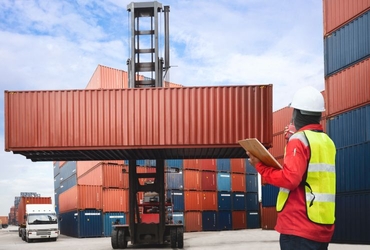
Top 5 shipping stories of 2017 Q1



With all that’s been going on in the ocean freight industry, time is passing by at an unusually quick rate. Already, we’re reaching the end of the first quarter of 2017. Three months into the year and definitely no lack of headlines.
Without further ado, let’s look at the top 5 shipping stories the industry has seen since the turn of the year.
5. Freight forwarders spend $500 million a year processing freight rates
A Drewry investigation has revealed that it costs freight forwarders a whopping half a billion annually to process carrier rates. According to the research, there are some 50,000 freight forwarders in the world who manage 48.4 million TEUs per year. Broken down, the total time spent per year managing these rates amount to 24.4 million hours. This translates into $500 million in salary time. Of these, the biggest forwarders spend around $1 million a year only in the labor costs needed to manage these rates.
“The size of these small businesses makes the process of receiving and processing carrier buy-rate information about twice as burdensome as for medium-sized forwarders. Therefore, this segment would likely benefit the most from a platform which consolidates and updates buy-rates.” – Drewry
It’s interesting to note that this $500 million figure does not include investment costs for supporting and streamlining processes.
4. Launch of SM Line
It’s the world’s newest shipping line, ironically, from South Korea, to replace the now-defunct Hanjin Shipping. Earlier this month, SM Line launched two intra-Asia services covering areas including Vietnam, China, South Korea and Thailand, and a West India service. Its current fleet stands at 12 ships – containing a mix of 6,500 TEU vessels previously owned by Hanjin.
SM Line has targets to part the dark clouds with ambitious plans to help the South Korean shipping industry recover. It’s planning to launch as many as nine routes this year. This includes a transpacific service to the US west coast next month with stops in Busan, Shanghai, Ningbo, and Long Beach. Five vessels will form part of this route. It certainly has the resources to do so, after acquiring Hanjin’s US-Asia route for $32 million. If that isn’t enough, the company is also planning an east coast route that will call at the Port of Savannah and New York/New Jersey Port targeted for late 2018, and South Korea-Japan and South Korea-China services.
Its five-year plan? To have 41 ships operating on 25 routes with $347 million in revenue.
3. The Alibaba lure
Maersk got the ball rolling when it announced its digital partnership with China’s Alibaba last December. Its agreement allows the shipping liner to list their freight spaces on Alibaba’s import/export platform.
Shortly after, France’s CMA CGM and Israel’s ZIM liner followed suit.
Traditionally, shippers book spaces on carriers via freight forwarders. However, with Alibaba’s channel, they can now reserve directly via the internet. And like a freight forwarder, it also offers help with customs clearance and logistics.
This is perhaps part of the industry’s efforts to boost sales. The sector continues to struggle amid a prolonged economic downturn, which has already resulted in an unprecedented number of M&As and in the more serious cases, bankruptcy. And as for E-commerce giant Alibaba, it’s one step forward into the logistics industry as it battles with Amazon.
“Shipping lines still need freight forwarders because they’re their biggest clients. Going directly to small end customers is something that’s not in their nature yet because they have to change they way they sell the service. As freight forwarders, we have the knowledge to adapt the services to their needs through technology and they will need a change of mentality of their customer service.“
– Carlos Hernández, Co-founder, iContainers
2. Preparation for new alliance reshuffle
The kick off of the new shipping alliances is just around the corner. Over the past few months, the three main groupings – Ocean Alliance, THE Alliance, 2M – have looked to firm up their services and routes.
Given the logistical nightmare that ensued following Hanjin Shipping’s collapse, FMC chief William Doyle called for alliances to set up an emergency fund – to which THE Alliance promptly complied. Ocean Alliance, on the other hand, maintains that its members are financially stable and does not require an emergency fund.
As noted by iContainers’ founder Carlos Hernández, this reshuffle will hopefully ‘shake things up’. It’ll be interesting to note how the alliances will play out. That’s given certain new cooperations by carriers who have never worked together before.
1. The official end of Hanjin Shipping
February 17th marked the end of South Korea’s Hanjin Shipping.** It was perhaps a rather cruel way to mark what-would-have-been its 40th anniversary.** Despite the news, it was a seemingly quiet affair. At least, compared to the waves generated last August when the company announced it was applying for court receivership.
The former South Korean liner was delisted from the domestic bourse earlier this month, after falling to below 1,000 won. This delisting officially ended Hanjin’s eight-year trading history. Over the past few months, its assets have been sold to various competitors. In total, its vessels sold for some $460 million in auctions houses. Of the shipping lines, Maersk chartered a massive 11 vessels from Hanjin’s fleet.
Seven months on, the liner’s bankruptcy continues to ripple across the industry. The downfall of such a sizeable liner is a learning lesson for others in the same boat. Here’s to a better outlook for the next quarter and calmer seas for the industry.
These are the 5 biggest #shipping shake-ups of 2017... for now 🚢 https://t.co/Kri0LnoIMQ pic.twitter.com/ozHMJoCzw5
— iContainers (@icontainers) April 3, 2017
Related Articles


